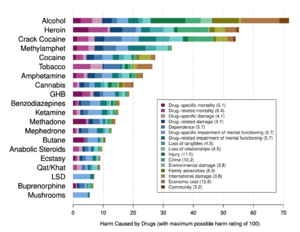Substance intoxication
Topic: Medicine
 From HandWiki - Reading time: 5 min
From HandWiki - Reading time: 5 min
| Substance intoxication |
|---|
Substance intoxication is a transient condition of altered consciousness and behavior associated with recent use of a substance.[1] It is often maladaptive and impairing, but reversible.[2] If the symptoms are severe, the term "substance intoxication delirium" may be used.[3]
Substance intoxication may often accompany a substance use disorder (SUD); if persistent substance-related problems exist, SUD is the preferred diagnosis.[4]
Classification
The ICD-10 Mental and Behavioural Disorders due to psychoactive substance use shows:[5]
- F10. alcohol
- F11. opioids
- F12. cannabinoids
- F13. sedatives and hypnotics
- F14. cocaine
- F15. caffeine
- F16. hallucinogens
- F17. tobacco
- F18. volatile solvent
- F19. multiple drug use and use of other psychoactive substances
Contact high
The term contact high is sometimes used to describe intoxication without direct administration, either by second-hand smoke (as with cannabis), or by placebo in the presence of others who are intoxicated.
Slang terms
Slang terms include: getting high (generic), being stoned, cooked, or blazed (usually in reference to cannabis),[6] and many more specific slang terms for particular intoxicants. Alcohol intoxication is graded in intensity from buzzed, to tipsy (all the way up to drunk, hammered, smashed, wasted, destroyed, shitfaced and a number of other terms).
See also
References
- ↑ Michael B. First; Allan Tasman (2 October 2009). Clinical Guide to the Diagnosis and Treatment of Mental Disorders. John Wiley and Sons. pp. 146–. ISBN 978-0-470-74520-5. https://books.google.com/books?id=jyXxmyysU7gC&pg=PA146. Retrieved 27 April 2010.
- ↑ Michael B. First; Allen Frances; Harold Alan Pincus (2004). DSM-IV-TR guidebook. American Psychiatric Pub. pp. 135–. ISBN 978-1-58562-068-5. https://archive.org/details/dsmivtrguidebook0000firs. Retrieved 27 April 2010.
- ↑ William H. Reid; Michael G. Wise (26 August 1995). DSM-IV training guide. Psychology Press. pp. 80–. ISBN 978-0-87630-768-7. https://books.google.com/books?id=PgzBZWzo6QMC&pg=PA80. Retrieved 27 April 2010.
- ↑ "Acute intoxication". World Health Organization. https://www.who.int/substance_abuse/terminology/acute_intox/en/.
- ↑ Drs; Sartorius, Norman; Henderson, A.S.; Strotzka, H.; Lipowski, Z.; Yu-cun, Shen; You-xin, Xu; Strömgren, E.; Glatzel, J. et al.. "The ICD-10 Classification of Mental and Behavioural Disorders Clinical descriptions and diagnostic guidelines". Microsoft Word. p. 65-76. https://www.who.int/classifications/icd/en/bluebook.pdf.
- ↑ Johnson BD, Bardhi F, Sifaneck SJ, Dunlap E (2005). "Marijuana Argot As Subculture Threads". British Journal of Criminology 46 (1): 46–77. doi:10.1093/bjc/azi053. https://scholar.google.co.uk/scholar?cluster=2831786369993753984&hl=en&as_sdt=0,5.
External links
| Classification |
|---|
 KSF
KSF
